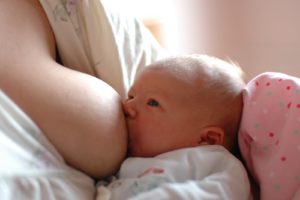
Credit: Wikimedia Commons/ Anton Nosik
Some women struggle with breastfeeding, and wind up breastfeeding for a shorter duration than other women. A recent study suggests one reason for women stopping breastfeeding early - they may have higher levels of PFAS chemicals, called "forever chemicals", in their bodies. These chemicals have many harmful health effects, including reproductive effects (such as endocrine disruption, higher levels of infertility).
The researchers analyzed levels of 5 different PFAS (perfluoroalkyl substances) chemicals in the blood of more than 1000 pregnant Dutch women. They found that those with higher levels breastfed their babies for a shorter time (up to 20% shorter time) than those with lower levels. [NOTE: almost all humans are contaminated with PFAS chemicals, but levels vary}
Where did the PFOS chemicals come from? These human-made chemicals are used as water and stain repellants, and as coatings in many common products. For example, in rugs and fabrics with added stain resistance, certain dental flosses (e.g., Oral-B Glide floss), non-stick pots and pans (e.g., Teflon coating), water resistant long-lasting make-up, water and stain resistant food packaging, and even many water supplies.
How can we reduce exposures to these chemicals and lower levels in our bodies? There are reasons they are known as "forever chemicals" - they stick around (persist), and contaminate both humans and the environment! But we can reduce our exposures to these chemicals and then levels in our bodies will go down. It just means making some changes.
For example, avoid using non-stick pots and pans, use plain waxed dental floss, cook more at home, and eat less take-out or fast-food (to avoid the water and grease resistant package coatings). For more tips: Avoiding Harmful Chemicals.
From Science Daily: PFAS exposure can affect women’s ability to breastfeed
Women with higher levels of PFAS in their system may be 20% more likely to stop breastfeeding early, according to a new study published in the Endocrine Society's Journal of Clinical Endocrinology & Metabolism.
Per- and polyfluoroalkyl substances (PFAS) are humanmade chemicals used as oil and water repellents and coatings for common products including cookware, carpets and textiles. These endocrine-disrupting chemicals do not break down when they are released into the environment, and they continue to accumulate over time. PFAS chemicals can affect pregnancy outcomes, the timing of puberty and other aspects of reproductive health.
"Our findings are important because almost every human on the planet is exposed to PFAS. These human-made chemicals accumulate in our bodies and have detrimental effects on reproductive health," said the study's first author Clara Amalie Gade Timmermann, Ph.D., assistant professor of the University of Southern Denmark in Copenhagen, Denmark. "Early unwanted weaning has been traditionally attributed to psychological factors, which are without a doubt important, but hopefully our research will help shift the focus and highlight that not all mothers can breastfeed despite good intentions and support from family and healthcare professionals."
The researchers analyzed blood samples for PFAS and prolactin concentrations from up to 1,286 pregnant women from the Odense Child Cohort. The women provided information about the duration of breastfeeding in weekly text messages or questionnaires at three and eighteen months postpartum. The researchers found women with higher levels of PFAS in their system were 20% more likely to stop breastfeeding early.
